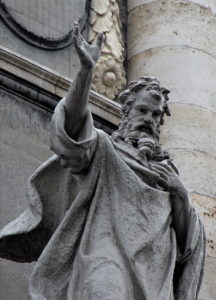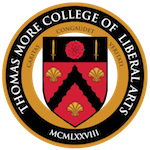
By Bridget Lawler, Class of 2018
At Thomas More College of Liberal Arts we do not concern ourselves with dry textbooks or bare facts, but with human action. We study the deeds and thoughts of men throughout the ages, from the philosophy and tragedy of the Ancient Greeks to the lawmaking of the American founders and beyond. We do so not simply because a knowledge of history is considered necessary for a good education, nor simply because history is a useful guide for our actions; rather, we do so because we believe man’s action has an inherent significance worth contemplating. As our mission statement asserts:
[E]very human life, from the moment of inception until natural death, is sacred because the human person has been willed for its own sake in the image and likeness of the living and holy God. The human and his endeavors are worthy of our regard, interest, and study.
Man is interesting to us especially because of his freedom. God created man with reason, which enables him to deliberate over and choose his own course of action. This power gives man freedom and means that he is master of himself. As Psalm 8 says, “You made him little less than a god.” The ultimate end of our freedom is to apprehend and embrace the truth, but we can use it for other ends. Thus, human history is a profound drama: in the life of every man stands the question of how he will use his freedom – to attain the truth or to follow his own designs? This question urges itself on us, and makes human action a subject worth our careful study.

In its mission statement, the College quotes the early Church Father St. Ireneaus in saying, “The glory of God is man fully alive, but the life of man is the vision of God.” Human action takes on an even greater significance when we consider this statement, for, if God’s glory is man fully alive, man’s life must be a noble thing. The life of every man is a manifestation of God’s goodness, an insight into His generosity, and a sign of His wisdom. When we see man living well, acting generously, mercifully, or courageously, we witness the nobility of human nature. This in turn is but a small intimation of the nobility of the divine nature. We at TMC study the Iliad, Aristotle, St. Benedict, and the Song of Roland because in studying these works, we come to a better understanding of human nature, and through a better understanding of man, we come to a better understanding of the nature of God.
Though our Faith moves us to give serious consideration to human action, it does not prompt us to brush aside “other cultures and other ages.” Our mission statement makes this clear. The College asserts that “all mankind has been created to know the highest truths and discover happiness in its final end”; the efforts of all cultures as they strive for this end merit our respect and consideration. We strive to practice a “Catholic humanism,” which studies many different traditions – as well as appreciating and delighting in the truths of practical science – always with the eyes of faith. “This Catholic humanism allows faith to illuminate reason, enliven culture, and give meaning to all learning.” Our Faith enables us to recognize the dignity in the desires of all men who earnestly pursue truth and happiness.
The belief in man’s essential nobility contradicts the standards of a world in which human life is regularly and heedlessly thrown away, but it influences all of our studies, as well as our community life. It moves us to treat each other with respect and generosity, taking pains to understand one another because we know that each man around us is worth understanding. It moves us to cultivate the virtues, for we know that the well-lived life is the best witness to God’s glory. And it fills us with joy, for we know that living is in itself a great good, and still more so living in the company of Christ. We hope to carry this joy into the world, that we may witness to the beauty of each human life.
